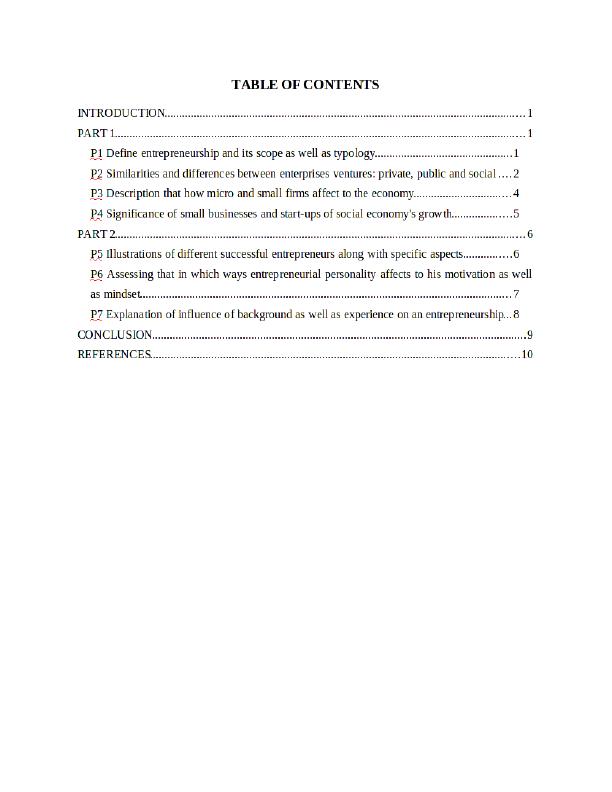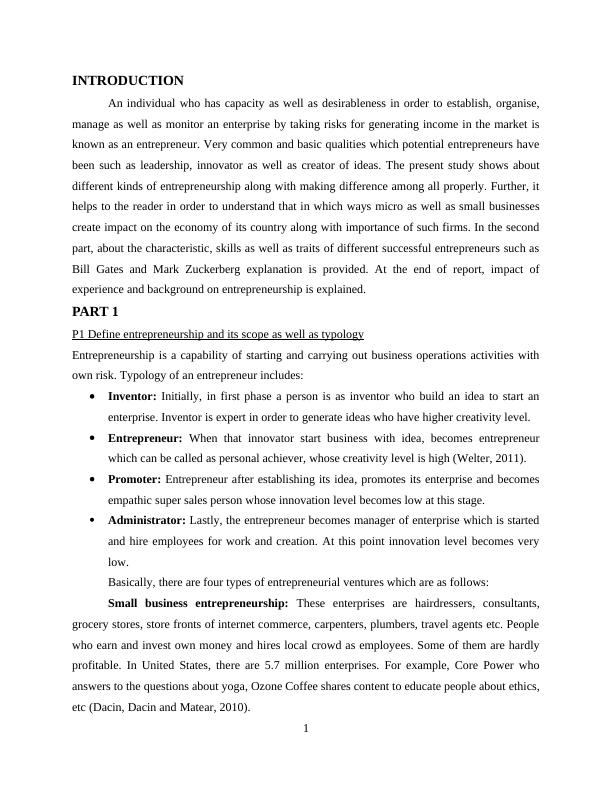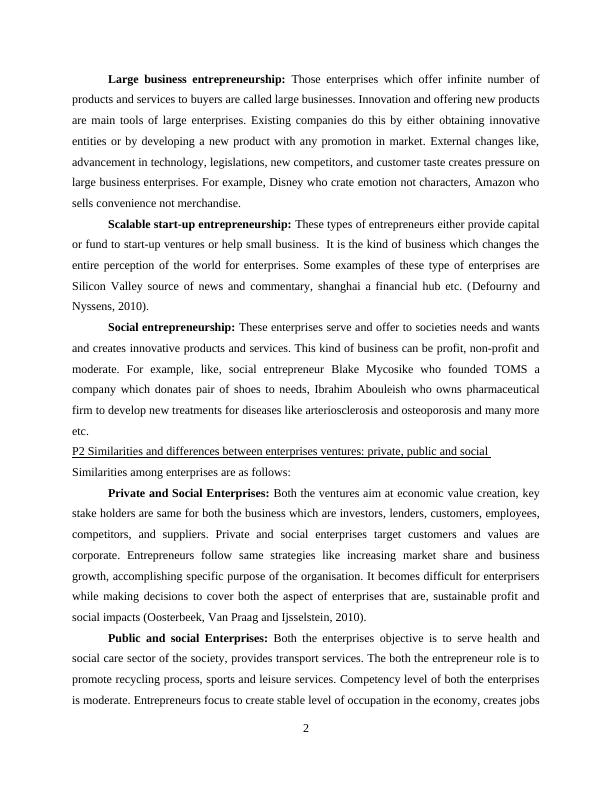Impact of Experience and Background on Entrepreneurship - Report
Added on 2020-07-23
13 Pages4190 Words94 Views
ENTREPRENEURSHIP


INTRODUCTIONAn individual who has capacity as well as desirableness in order to establish, organise,manage as well as monitor an enterprise by taking risks for generating income in the market isknown as an entrepreneur. Very common and basic qualities which potential entrepreneurs havebeen such as leadership, innovator as well as creator of ideas. The present study shows aboutdifferent kinds of entrepreneurship along with making difference among all properly. Further, ithelps to the reader in order to understand that in which ways micro as well as small businessescreate impact on the economy of its country along with importance of such firms. In the secondpart, about the characteristic, skills as well as traits of different successful entrepreneurs such asBill Gates and Mark Zuckerberg explanation is provided. At the end of report, impact ofexperience and background on entrepreneurship is explained. PART 1P1 Define entrepreneurship and its scope as well as typologyEntrepreneurship is a capability of starting and carrying out business operations activities withown risk. Typology of an entrepreneur includes:Inventor: Initially, in first phase a person is as inventor who build an idea to start anenterprise. Inventor is expert in order to generate ideas who have higher creativity level.Entrepreneur: When that innovator start business with idea, becomes entrepreneurwhich can be called as personal achiever, whose creativity level is high (Welter, 2011).Promoter: Entrepreneur after establishing its idea, promotes its enterprise and becomesempathic super sales person whose innovation level becomes low at this stage.Administrator: Lastly, the entrepreneur becomes manager of enterprise which is startedand hire employees for work and creation. At this point innovation level becomes verylow.Basically, there are four types of entrepreneurial ventures which are as follows: Small business entrepreneurship: These enterprises are hairdressers, consultants,grocery stores, store fronts of internet commerce, carpenters, plumbers, travel agents etc. Peoplewho earn and invest own money and hires local crowd as employees. Some of them are hardlyprofitable. In United States, there are 5.7 million enterprises. For example, Core Power whoanswers to the questions about yoga, Ozone Coffee shares content to educate people about ethics,etc (Dacin, Dacin and Matear, 2010).1

Large business entrepreneurship: Those enterprises which offer infinite number ofproducts and services to buyers are called large businesses. Innovation and offering new productsare main tools of large enterprises. Existing companies do this by eitherobtaining innovativeentities or by developing a new product with any promotion in market. External changes like,advancement in technology, legislations, new competitors, and customer taste creates pressure onlarge business enterprises. For example, Disney who crate emotion not characters, Amazon whosells convenience not merchandise.Scalable start-up entrepreneurship: These types of entrepreneurs either provide capitalor fund to start-up ventures or help small business. It is the kind of business which changes theentire perception of the world for enterprises. Some examples of these type of enterprises areSilicon Valley source of news and commentary, shanghai a financial hub etc. (Defourny andNyssens, 2010).Social entrepreneurship: These enterprises serve and offer to societies needs and wantsand creates innovative products and services. This kind of business can be profit, non-profit andmoderate. For example, like, social entrepreneur Blake Mycosike who founded TOMS acompany which donates pair of shoes to needs, Ibrahim Abouleish who owns pharmaceuticalfirm to develop new treatments for diseases like arteriosclerosis and osteoporosis and many moreetc.P2 Similarities and differences between enterprises ventures: private, public and social Similarities among enterprises are as follows: Private and Social Enterprises: Both the ventures aim at economic value creation, keystake holders are same for both the business which are investors, lenders, customers, employees,competitors, and suppliers. Private and social enterprises target customers and values arecorporate. Entrepreneurs follow same strategies like increasing market share and businessgrowth, accomplishing specific purpose of the organisation. It becomes difficult for enterpriserswhile making decisions to cover both the aspect of enterprises that are, sustainable profit andsocial impacts (Oosterbeek, Van Praag and Ijsselstein, 2010).Public and social Enterprises: Both the enterprises objective is to serve health andsocial care sector of the society, provides transport services. The both the entrepreneur role is topromote recycling process, sports and leisure services. Competency level of both the enterprisesis moderate. Entrepreneurs focus to create stable level of occupation in the economy, creates jobs2

End of preview
Want to access all the pages? Upload your documents or become a member.
Related Documents
Analysing Opportunities for Individuals to achieve Experience and Skills through Research and Practiceslg...
|15
|4298
|441
Entrepreneurship and Small Business Managementlg...
|15
|2735
|57
Assignment on Entrepreneurship & Small Business Management (pdf)lg...
|12
|3294
|469
Entrepreneurial Ventureslg...
|14
|3755
|53
Small Business Management and Entrepreneurship in the Social Economylg...
|14
|4025
|255
Entrepreneurship and Small Business Managementlg...
|11
|3085
|77
